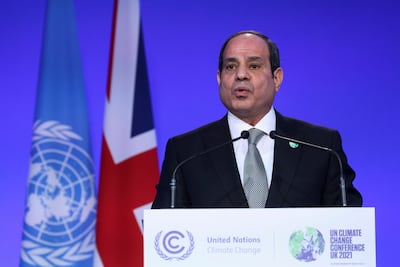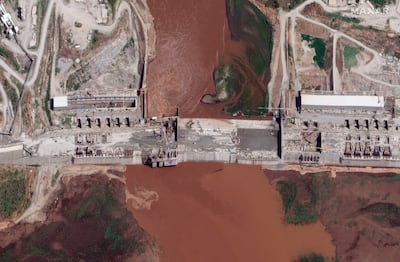President Abdel Fattah El Sisi has told Egyptians that a large dam being built by Ethiopia on the Nile will not reduce Egypt’s share of the river's water.
“No one can come near Egypt’s water," Mr El Sisi said late on Monday.
"How? We talk, we employ diplomacy and patience," he said, without addressing recent comments by Ethiopian officials that Addis Ababa was open to resuming talks on the Grand Ethiopian Renaissance Dam.
The last round of talks between Ethiopia, Egypt and Sudan on the hydroelectric dam, in April last year, broke down amid a flurry of acrimonious comments by officials from the three Nile basin nations that have a combined population of about 250 million.
Meanwhile, Egypt has embarked on large water conservation projects that will make the maximum use of the Nile’s water, Mr El Sisi said.
The most populous Arab nation depends on the river for more than 90 per cent of its fresh water needs.

"I have done everything that could be done," he said. "I was patient, gave a chance and worked with what I have to maximise its use.”
Egypt has repeatedly said that a reduction in its share of the Nile waters, currently at about 55 billion cubic metres, could wipe out hundreds of thousands of jobs in its large agriculture sector and upset its delicate food balance at a time when its population is increasing by more than two million every year.
Sileshi Bekele, Ethiopia’s former negotiator on the dam and the country’s ambassador to the US, expressed earlier this month Addis Ababa’s interest in the resumption of the talks during a meeting with the new US special envoy to the Horn of Africa, Mike Hammer.
Ethiopia’s foreign ministry cited the ambassador as highlighting “Ethiopia’s interest to resume the African Union-led trilateral negotiation over the GERD”.
Blue and White Nile rivers
Egypt and Sudan, its southern neighbour, have long insisted that Ethiopia must enter a legally binding agreement on the filling and running of the $5 billion dam on the Blue Nile, which contributes more than 80 per cent of the combined water volume after joining the White Nile in northern Sudan.
Sudan maintains that real-time data on the dam’s operation would spare it from floods and ensure work at its own power-generating dams on the Blue Nile isn't disrupted.

Ethiopia says the electricity generated by the dam, the largest in Africa, will lift millions out of poverty and allow the impoverished Horn of Africa nation to tap its vast natural resources.
It refuses to enter a legally binding deal on the dam, arguing that recommendations should be sufficient.
Addis Ababa has also rejected proposals by Cairo and Khartoum that the World Bank, the EU and the US be involved in the talks as mediators.
In February, Ethiopia said it had started producing power from one unit of the dam and is set for a third filling of the water reservoir behind the dam this summer during the peak of the flood season.







